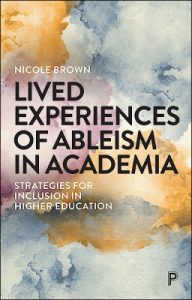
This is an extract from my contribution to the LSE Impact blog exploring lessons from the COVID-19 pandemic:
Prior to the COVID-19 pandemic a significant and influential body of academic research had begun to take shape around the experience of ableism within the academy. In this post, Nicole Brown reflects on how the pandemic has made this work more relevant than ever and the opportunity it presents for individuals and institutions to learn and face the complexities of genuine inclusion in higher education.
For me, there are two learning points to take away from COVID-19 reflections:
- Ableds see the spoonie lifestyle as a crisis.[1]
- Spoonies are the strongest people, and their demands for adjustment and support are not so unreasonable.
I am in absolute agreement with all disability, chronic illness and neurodivergence activists, advocates and allies that more needs to be done. Structural issues need to be considered and obstacles removed. Yes, often there are no satisfying solutions possible because people’s needs are often conflicting. For example, people with issues around sensory overload may want cameras to be switched off in a conference call, whereas people with hearing impairments may want them on so they can lip-read. So yes, there is no simple solution. However, what COVID-19 has taught us – or at least should have – is that we cannot know what it feels like to be in someone else’s shoes, to feel what others feel, to experience what others experience, but that we should listen carefully and empathetically to what they do tell us about their lives, rather than dismiss their concerns, queries and attempts to ask for help and reasonable adjustment as an inconvenience. In 2020, in the conclusion to my book, Lived Experiences of Ableism in Academia, I wrote:
“I am truly hopeful and entirely optimistic. … I am hopeful and optimistic that once this crisis is over, as a society we will not return to expectations around ways of working that were commonplace before COVID-19. … Instead, the disabled and able-bodied, chronically ill and healthy, neurodivergent and neurotypical will all work alongside one another with the heightened sense of community and empathy that the contributors to this edited book have been asking for. This is my disability imaginary of the future.”
I still hold on to that optimism and hopefulness, though perhaps more sobered. At the time of writing that conclusion it was still early days in the pandemic. I was able to see the massive improvements the technological development brought to the lives of disabled, chronically ill and/or neurodivergent academics. Twenty months on the political, economic and societal push towards “normality” and calls to “return to offices” become increasingly louder. Already, despite the fact that we are still in the pandemic, we are seeing conferences and meetings being organised as in-person events only. With presenteeism taking hold once again, I worry that the many changes for the better become unravelled and undone. As individuals and institutions, we need to hold on to the positive developments and actively and proactively make sure that we learn from what COVID-19 has taught us.
As individuals and institutions, we need to hold on to the positive developments and actively and proactively make sure that we learn from what COVID-19 has taught us